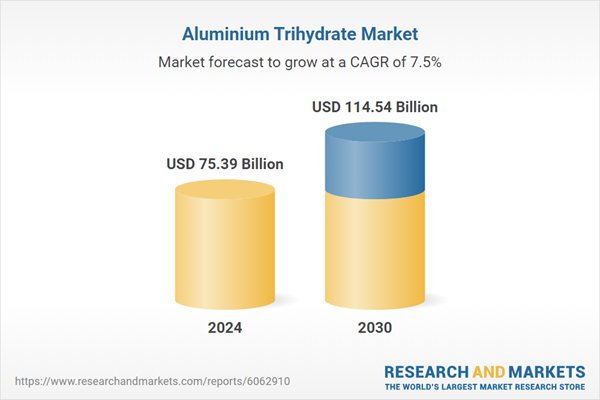Speak directly to the analyst to clarify any post sales queries you may have.
10% Free customizationThis report comes with 10% free customization, enabling you to add data that meets your specific business needs.
The increasing focus on fire safety standards, environmentally sustainable materials, and high-performance additives is significantly boosting demand for ATH. However, market dynamics are also shaped by factors including raw material availability, fluctuating production costs, and environmental considerations.
Key Market Drivers
Expanding Use in Flame Retardants Across Industries
A major growth driver for the ATH market is its extensive application as a flame retardant in sectors such as construction, automotive, electronics, and textiles. ATH is favored due to its low toxicity, smoke suppression characteristics, and environmental compatibility. The global shift toward non-halogenated flame retardants - prompted by the implementation of stringent fire safety regulations - is further accelerating demand.Growth in the Pharmaceutical Industry
The expanding pharmaceutical sector is another significant driver of the ATH market, as aluminium trihydrate is widely used in pharmaceutical formulations, particularly as an antacid and excipient. In 2023, the global pharmaceutical industry generated approximately USD 1.6 trillion, placing its economic scale alongside major national GDPs such as Spain, Mexico, and Australia.ATH’s role in the formulation of antacids is well-established, with its capacity to neutralize gastric acid, provide localized hemostasis, and protect ulcerated tissue. Though its onset is gradual and its effect moderate, ATH remains an essential ingredient in over-the-counter treatments for acid reflux, heartburn, and gastritis. The increasing prevalence of gastrointestinal issues - driven by dietary shifts, heightened stress levels, and an aging population - is fueling the consumption of ATH in this segment.
Key Market Challenges
Volatility in Raw Material Pricing
Bauxite, the primary raw material for aluminium trihydrate production, is predominantly sourced from countries such as Australia, Guinea, China, and Brazil. The supply chain is susceptible to geopolitical disruptions, export controls, and environmental regulations, all of which contribute to market instability.For instance, export restrictions imposed by key producing nations can trigger price surges, directly affecting ATH production costs. Additionally, environmental policies aimed at reducing ecological impact and carbon emissions have introduced stricter mining regulations. Compliance with these regulations often leads to increased operational costs, which in turn raise the overall price of aluminium trihydrate.
Key Market Trends
Rising Demand in Flame Retardant Applications
The growing demand for ATH in flame retardant applications represents a pivotal trend in the global market. Heightened fire safety regulations, the push for non-toxic alternatives, and broader industrial adoption are contributing to the increased use of ATH-based materials.Companies such as 20 Microns are addressing this demand with halogen-free flame retardants and smoke suppressants under product lines like AL-FR and Mag FR. ATH, also known as aluminium oxide trihydrate, is widely recognized as a cost-effective and efficient flame retardant in the plastics industry due to its heat absorption and endothermic dehydration properties - both of which significantly slow polymer combustion.
The enforcement of stricter fire safety standards by regulatory authorities - such as the National Fire Protection Association (NFPA) in the U.S. and the European Union’s REACH regulation - is driving industries to adopt halogen-free solutions. As a result, ATH is increasingly being incorporated into coatings, composites, and polymer systems to achieve compliance and enhance product safety.
Key Market Players
- Dadco Alumina and Chemicals Limited
- Zibo Joyreach New Materials Co., Ltd
- Vizag Chemical International
- KMT Industrial (HK)Ltd
- Alcoa World Alumina and Chemicals
- NALCO
- South32 Company
- UC Rusal group
- CHALCO
- Guinea Alumina Corporation
Report Scope
In this report, the Global Aluminium Trihydrate Market has been segmented into the following categories, in addition to the industry trends which have also been detailed below:Aluminium Trihydrate Market, By Sales Channel:
- Direct
- Indirect
Aluminium Trihydrate Market, By End Use:
- Alumina
- Fire-Retardant
- Pharmaceuticals
- Cosmetics
- Others
Aluminium Trihydrate Market, By Region:
- North America
- United States
- Canada
- Mexico
- Europe
- France
- United Kingdom
- Italy
- Germany
- Spain
- Asia Pacific
- China
- India
- Japan
- Australia
- South Korea
- South America
- Brazil
- Argentina
- Colombia
- Middle East & Africa
- South Africa
- Saudi Arabia
- UAE
Competitive Landscape
Company Profiles: Detailed analysis of the major companies present in the Global Aluminium Trihydrate Market.Available Customizations:
With the given market data, the publisher offers customizations according to a company's specific needs. The following customization options are available for the report.Company Information
- Detailed analysis and profiling of additional market players (up to five).
This product will be delivered within 1-3 business days.
Table of Contents
Companies Mentioned
- Dadco Alumina and Chemicals Limited
- Zibo Joyreach New Materials Co., Ltd
- Vizag Chemical International
- KMT Industrial (HK)Ltd
- Alcoa World Alumina and Chemicals
- NALCO
- South32 Company
- UC Rusal group
- CHALCO
- Guinea Alumina Corporation
Table Information
| Report Attribute | Details |
|---|---|
| No. of Pages | 185 |
| Published | April 2025 |
| Forecast Period | 2024 - 2030 |
| Estimated Market Value ( USD | $ 75.39 Billion |
| Forecasted Market Value ( USD | $ 114.54 Billion |
| Compound Annual Growth Rate | 7.5% |
| Regions Covered | Global |
| No. of Companies Mentioned | 10 |









